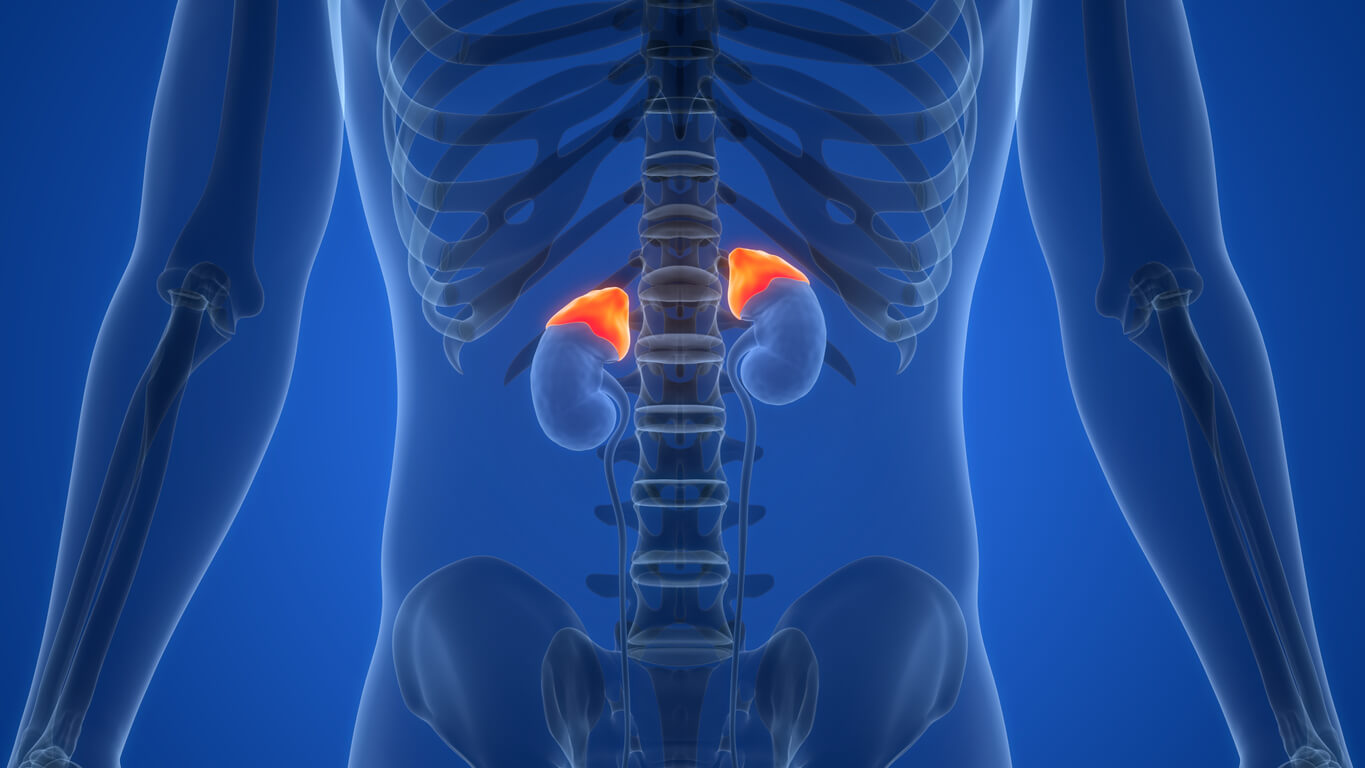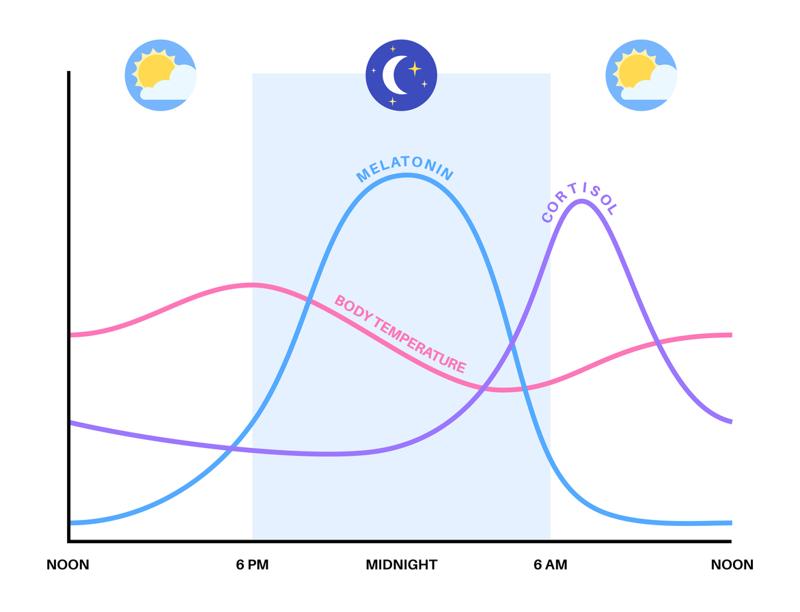In the 1930s, a clumsy researcher at the University of Prague kept dropping his laboratory rats.
While Hans Selye was studying the effects of certain chemicals on the rodents’ sex hormones, he would routinely chase the frightened rodents around his lab, bemoaning his lack of coordination. What he didn’t realize was that his mishaps were leading to one of the most important discoveries in modern medicine. The rats who received the treatment and the control group were both being chased around the lab regularly, and they both developed the same mysterious symptoms: enlarged adrenal glands and stomach ulcers.
(Our view on the use of animals in medical research is here.)

Selye had stumbled upon what we now call the stress response — and the hormone at its center, cortisol. In this article, you’ll meet cortisol and discover why it’s so much more than just a stress hormone. You’ll see how it functions in the body, and what happens if you have too much or too little, or if its daily rhythm gets disrupted.
We’ll also explore solutions, including the best foods, nutrients, and lifestyle practices (and possibly supplements) to support a healthy cortisol balance, plus how to test your cortisol levels and when it’s advisable to get professional guidance.
What Is Cortisol?

Cortisol is a steroid hormone produced by the adrenal glands. Steroids are characterized by a distinctive four-ring structure; other well-known examples include testosterone and estrogen.
Cortisol is often referred to as the stress hormone because it plays a vital role in your body’s response to stress. What’s less well known is that it’s involved in many bodily functions beyond stress management; cortisol also regulates metabolism and blood sugar, reduces inflammation, controls salt and water balance (which affects your blood pressure), and supports wakefulness and energy during the day via your circadian rhythms.
Cortisol’s Daily Work Schedule

Your cortisol levels change throughout the day, ideally based on how much energy you need at any given time. This daily rhythm affects not just “get-up-and-go,” but also mood, metabolism, and the ability to handle stressors.
A healthy cortisol workday starts with a morning peak, typically at its highest 30–45 minutes after waking up. Scientists who like acronyms refer to this as the CAR, or cortisol awakening response. (Insert corny “vroom-vroom” joke here.)
This surge helps you wake up and feel alert. It tells your metabolism to increase blood sugar as fuel for movement. It supports healthy blood pressure, and helps you focus on important tasks and environmental cues. Think of it as your body’s built-in cup of coffee.
Interestingly, the CAR also suppresses your immune response. This prevents your immune system from overreacting to normal tissue repair that occurs during sleep. (It’s like turning off your home’s alarm system so workers can get in and repair the leaking kitchen faucet.)
In most healthy people, cortisol levels naturally decline throughout the day. This gradual taper allows you to maintain stable energy levels without tipping into overstimulation (think overtired toddler past bedtime). It also supports a regular eating pattern by syncing your metabolic activity with your food intake.
By bedtime, cortisol should be on its way down, reaching its lowest point around midnight. This allows melatonin, the sleep hormone, to rise. Your body relaxes and focuses on digestion and tissue repair rather than external activity. It invites you into a night of deep, restorative sleep.
Cortisol and Stress

Let’s get back to cortisol’s main claim to fame: When you’re stressed out, your brain tells your adrenal glands to release cortisol into the bloodstream. It works like a game of telephone, but in this case, the network isn’t AT&T, but the HPA axis, and the message doesn’t get garbled, but amplified.
The HPA axis is named after the three glands that participate in the message relay. The hypothalamus, which you can think of as the brain’s control center, detects stress and sends a “release cortisol” signal. This signal gets picked up by the pituitary gland, which is the body’s message delivery center. The pituitary raises the volume, adds a “code red” tag, and places an order with the adrenal glands, the factories that produce the cortisol and pump it into your bloodstream.
The result is a stress response, which often looks like “fight or flight.” That is, the body mobilizes to deal with what the mind perceives as an immediate physical threat to life and limb. It’s a good thing we’ve got this response, because it’s what allowed our ancestors to survive long enough to produce other ancestors who eventually produced us.
The problem isn’t that we turn into the Flash or the Incredible Hulk when faced with a predator; instead, it’s that most of us in the modern world are flooding our bodies with cortisol on a chronic basis. Modern life throws at most of us, not predators and murderous rivals, but traffic jams, social media arguments, and work deadlines. We then deal with all that using the same biology our ancestors used to survive on the tundra and savannah. And those daily stressors drain our energy, dampen our mood, and damage our health.
Some of the symptoms of chronically elevated cortisol levels include weight gain (especially around the abdomen), insomnia, anxiety and mood disturbances, high blood pressure, blood sugar dysregulation, and a weakened immune system. This last can lead to frequent infections and illnesses.
In the long term, chronically elevated cortisol can lead to depression and mental health disorders, accelerated aging, cognitive decline, and cardiovascular disease.
Can Cortisol Be Too Low?

Too much cortisol, especially over time, can wreak havoc on the body. But too little can be a problem, too. People with Addison’s Disease, a rare condition of primary adrenal insufficiency, don’t produce enough cortisol. They often suffer from extreme fatigue, low blood pressure (especially when standing), salt cravings, and poor stress tolerance.
This brings us to a more controversial topic: adrenal fatigue. This term, popularized by some alternative medicine practitioners, describes a collection of symptoms — like fatigue, brain fog, anxiety, digestive issues, and poor sleep — that they attribute to the adrenal glands becoming “burned out” from chronic stress. The theory goes that this leads to cortisol levels that are chronically too low.
However, mainstream endocrinologists don’t recognize adrenal fatigue as a legitimate medical diagnosis. Studies don’t consistently show cortisol abnormalities in people labeled with it, and many continue to produce normal amounts of cortisol.
Still, that doesn’t mean there’s no real issue. Many people with these symptoms are clearly struggling. A growing body of evidence points to stress-related nervous system dysregulation, and sometimes chronically elevated cortisol, as the deeper root cause. Over time, the body may become desensitized to cortisol’s effects or experience circadian rhythm disruptions, without the adrenals failing outright.
In other words, whether or not the problem is “adrenal fatigue,” it could be a form of stress overload — and the solution may lie not in boosting cortisol, but in calming the system that’s been running on overdrive for too long.
How To Naturally Lower High Cortisol
Fortunately, there are a lot of things you can do to bring high cortisol levels into a healthy balance. These include dietary improvements, as well as lifestyle changes that reduce stress and prioritize recovery.
Lifestyle Shifts

Moderate exercise reduces levels of stress hormones like adrenaline and cortisol while stimulating the production of endorphins, which are your brain’s natural painkillers and mood elevators. The key is finding the sweet spot: Gentle activities like yoga, walking, tai chi, and moderate aerobic exercise for about 30 minutes daily can reliably reduce cortisol, while high-intensity workouts or long-duration intense cardio can significantly spike cortisol levels in the short term.
Interestingly, moderate exercise helps you respond more calmly to future stressors; a morning walk might help you handle an afternoon deadline with more grace. Yoga and tai chi deserve special mention here because they combine movement with breathwork and mindfulness, engaging your parasympathetic nervous system to shift your body out of stress mode actively.
Sleep: Your Cortisol Reset Button

We’ve seen that cortisol levels follow a daily rhythm, typically lowest around midnight and peaking around 9 a.m. Poor sleep can throw this entire system out of whack. Recent research tracking daily cortisol and sleep patterns has found that higher cortisol levels before bed predict shorter sleep, poorer sleep quality, and longer time to fall asleep that same night. Not getting enough sleep one night results in higher cortisol levels the next evening, making it even harder to fall asleep the following night. Talk about a vicious cycle!
Good sleep hygiene helps restore your natural cortisol rhythm. It includes strategies like consistent sleep timing, getting bright light (ideally sunlight) first thing in the morning, avoiding evening screens, and keeping your bedroom cool, dark, and quiet.
Cortisol and Mindfulness

Mindfulness and breathwork can do magic for your excessive cortisol levels. A 2021 study found that participants in a three-month mindfulness meditation retreat showed direct correlations between increased mindfulness scores and decreased cortisol levels.
A comprehensive 2024 meta-analysis of 58 studies found that mindfulness and relaxation practices, including focused breathwork and body scans, consistently outperformed other interventions in reducing cortisol, with the largest reductions seen in that morning CAR.
You don’t need hours of meditation; simple breathing techniques like box breathing (inhale 4, hold 4, exhale 4, hold 4) or the 4–7–8 technique can calm your nervous system and lower cortisol in under 5 minutes by directly engaging your vagus nerve and shifting you out of fight-or-flight and into “rest and digest” mode.
Dietary Approaches

What you put on your plate plays a surprisingly powerful role in managing your body’s stress response. Research shows that following a whole food diet rich in vegetables, fruits, legumes, and healthy fats can significantly dampen cortisol levels compared to diets high in processed foods, refined sugars, and saturated fats.
The Mediterranean diet pattern, which emphasizes lots of colorful produce, whole grains, nuts, and seeds, has been studied specifically for its cortisol-lowering effects. A 2018 study found that a Mediterranean-style diet led to lower cortisol levels and reduced stress reactivity.
Consumption of magnesium-rich foods like leafy greens, nuts, and seeds can also help to regulate cortisol by supporting your nervous system and calming overexcited brain circuits that trigger stress responses.
On the flip side, while coffee has significant health benefits, lowering cortisol levels isn’t one of them. Caffeine can increase baseline cortisol secretion throughout the day and heighten your stress response. Research also tells us that foods high in added sugars and refined grains are associated with significantly higher cortisol levels, and that alcohol disrupts your natural cortisol rhythm and can leave you feeling more anxious the next day.
Best Foods To Support Cortisol Balance

Here is a list of science-supported, whole foods that help promote healthy cortisol balance. They support the HPA axis, lower inflammation, regulate blood sugar, and/or buffer the body’s stress response.
1. Leafy Green Vegetables
Vegetables like spinach, Swiss chard, and kale are rich in magnesium, which as we’ve just seen is critical for adrenal health and moderating the body’s stress response. Among many other crucial functions, magnesium helps reduce HPA axis reactivity and supports sleep.
For more on leafy greens, see our article here.
2. Nuts and Seeds
Almonds, pumpkin seeds, sunflower seeds, flaxseeds, hemp seeds, chia seeds, and others are good sources of magnesium, zinc, and healthy fats. Zinc plays a role in HPA axis feedback regulation, and omega-3s (in abundance in flax and chia seeds) help reduce systemic inflammation.
For more on leafy nuts and seeds, see our article here.
3. Legumes (e.g., lentils, black beans, chickpeas)
Beans, chickpeas, peas, and lentils are high in complex carbohydrates, B vitamins, plant-based protein, and fiber. These nutrients help maintain stable blood sugar and support nervous system resilience, both of which are essential for cortisol regulation.
For more on legumes, see our article here.
4. Whole Grains (e.g., oats, quinoa, brown rice, buckwheat)
Whole grains like oats, quinoa, brown rice, buckwheat, and others provide fiber, complex carbs, and B vitamins. Like legumes, they stabilize blood glucose, prevent cortisol spikes triggered by hypoglycemia, and nourish your gut, which is heavily involved in a healthy stress response.
For more on whole grains, see our article here.
5. Berries and Fruits
Strawberries, oranges, kiwis, guavas, and many other fruits are rich in vitamin C, a known cortisol-lowering antioxidant that also supports adrenal function.
For more on fruit, see our article here.
6. Fermented Foods
Fermented foods like sauerkraut, miso, kimchi, and tempeh support a diverse and healthy gut microbiome, which can influence cortisol production. Improved gut health has been linked to better stress resilience.
For more on fermented foods, see our article here.
7. Green and Herbal Teas (and herbal teas like chamomile or lemon balm)
Green tea contains L-theanine, which promotes relaxation without drowsiness and helps reduce cortisol response to stress. Herbal teas such as chamomile and lemon balm support parasympathetic tone and sleep.
For more on tea, see our article here.
8. Dark Chocolate (fair trade, at least 70% cacao, unsweetened or lightly sweetened)
In the “almost too good to be true” department, dark chocolate may reduce perceived stress and lower cortisol, as well as providing magnesium and polyphenols to benefit mood and vascular health.
A 2019 study (out of Switzerland, fittingly) found that people who ate 25 grams per day of high-polyphenol dark chocolate for 4 weeks had lower salivary cortisol compared to the folks who ate low-polyphenol dark chocolate. Many of the participants who ate the high-polyphenol chocolate also reported being in a better mood. (Imagine that!)
For more on chocolate, see our article here.
Understanding Cortisol Testing: Getting Accurate Results

When it comes to testing cortisol levels, timing matters. As we’ve seen, your body naturally produces the highest amounts of this stress hormone early in the morning, with levels gradually declining throughout the day. This natural rhythm means that when you test matters just as much as what you’re testing for, so any cortisol assessment needs to account for these expected fluctuations.
For the most accurate results, there are several factors to consider before testing. Caffeine and alcohol can influence your results, as can intense physical activity, so steering clear of these factors before testing will give you a clearer picture of your baseline cortisol patterns.
Also, major stressors can temporarily spike cortisol levels, so it’s best to avoid high-stress situations beforehand. (Easier said than done!)
The type of test your healthcare provider recommends will largely depend on the symptoms you’re experiencing and your health context. If you’re dealing with persistent fatigue, unexplained weight changes, sleep disturbances, or heightened anxiety levels, these symptoms help guide which testing approach will be most informative for understanding your unique cortisol profile and developing an appropriate management strategy.
| Test Type | Best For | Pros | Cons |
| Salivary | Diurnal rhythm, stress, adrenal fatigue | Non-invasive, multiple time points | May vary with hydration/sleep |
| Blood (Serum) | Diagnosing adrenal disorders | Standardized, clinical gold standard | One-time snapshot only |
| Urinary (24-hour) | Overall cortisol load | Full-day insight | Inconvenient, affected by kidneys |
| DUTCH (Dried Urine) | Functional view of cortisol + hormones | Comprehensive hormone profile | Expensive, less mainstream |
Can Supplements Help With Cortisol Balance?

While nothing replaces good food, quality sleep, and finding ways to chill out, some natural supplements might give you that extra support when life gets overwhelming.
Here are several research-backed supplements for stress support and cortisol balance.
Ashwagandha (Withania somnifera)
This adaptogenic herb has demonstrated significant promise in clinical studies. A 2012 study found that 300 milligrams of standardized extract taken twice daily for 60 days meaningfully reduced serum cortisol levels while improving stress resilience and mood.
For more on ashwagandha, see our article here.
Our favorite supplement comes from our friends at Purality Health (linked here).
Phosphatidylserine
This substance, which sounds like the main character in a Jurassic Park movie, plays a crucial role in modulating the HPA axis. A 2014 study of 75 stressed-out men showed that 400 milligrams of phosphatidylserine, when combined with 400 milligrams of phosphatidic acid, blunted excessive cortisol spikes in response to acute stress.
Rhodiola rosea
Well-regarded for its adaptogenic properties, Rhodiola has shown effectiveness in enhancing mental performance and energy while helping normalize cortisol patterns, particularly in people experiencing burnout or chronic fatigue.
Magnesium
Essential for proper adrenal function, magnesium is closely linked to increased stress resilience and lower cortisol output. At FRN, we advocate a food-first philosophy that prioritizes a varied, whole food, plant-based diet rich in natural magnesium sources. And there may be some instances in which targeted supplementation can be a helpful adjunct when additional support is needed. The glycinate and citrate forms offer superior bioavailability and digestive tolerance.
For more on magnesium, see our article here.
L-Theanine
This amino acid, naturally found in green tea (and especially high in matcha), promotes relaxation without sedation. Studies demonstrate its ability to reduce stress-induced cortisol elevation while maintaining mental clarity and focus.
We love the Sun Goddess Matcha from our friends at Pique.
Omega-3 Fatty Acids (EPA/DHA)
These essential fatty acids help modulate inflammatory responses and HPA axis activity. A 2011 study found that 2.5 grams daily significantly reduced both cortisol levels and subjective stress responses.
For more on omega-3 fatty acids, see our article here.
COMPLEMENT’s Omega Complex is a great option for supplementing EPA, DHA, and SDA omega-3s.
Vitamin C
Critical for adrenal gland function, vitamin C supports the body’s ability to clear cortisol efficiently after a stressful episode. It also reduces the oxidative damage caused by cortisol spikes. A 2002 study found that consuming 3,000 milligrams daily led to meaningful improvements in stress recovery.
For more on vitamin C, see our article here.
Important Considerations
Supplements should be viewed as complementary to, not replacements for, fundamental lifestyle practices including quality sleep, balanced nutrition, appropriate boundaries, and stress-reduction techniques. Individual responses to adaptogens can vary significantly, and some may actually increase stimulation in sensitive people.
It’s generally best to work with a qualified healthcare practitioner before beginning any supplement regimen, particularly if you’re taking medications or managing hormone-related conditions.
Cortisol-Friendly Recipes
When your body feels wired, worn out, or slightly off track, food can become one of your most powerful tools. Here are three recipes that feature ingredients to help support a healthy cortisol rhythm, including magnesium-rich seeds, fiber-filled legumes, fermented foods, and antioxidant-packed fruits. Whether you’re in the mood for something creamy, crisp, or deeply nourishing, you’ll find a dish designed to help your body find its natural balance.
1. Chocolate Raspberry Smoothie

The Chocolate Raspberry Smoothie combines vitamin C-rich raspberries and antioxidant-loaded cacao for a delicious way to support adrenal health. With raw almonds and dates for steady energy and magnesium, this blend helps regulate stress hormones while offering a soothing, chocolatey treat your nervous system will appreciate.
2. Plant-Powered Lunch Bowl

The Plant-Powered Lunch Bowl is a vibrant mix of kale, sweet potatoes, chickpeas, and avocado that fuels your body with cortisol-calming nutrients. From turmeric’s inflammation-fighting properties to hemp seeds and leafy greens rich in magnesium, this bowl brings together the kind of steady energy and nourishment your stress system thrives on.
3. Kelp Salad with Baked Tempeh and Kimchi Miso Dressing

The Kelp Salad with Baked Tempeh and Kimchi Miso Dressing offers deep nourishment for your gut and your stress response. Fermented ingredients like kimchi and tempeh feed a resilient microbiome, while mineral-rich kelp and crunchy vegetables bring texture, balance, and plant-based support to help regulate cortisol production from the inside out.
Conclusion: Cultivating Calm and Cortisol Harmony

Cortisol is essential for life, but balance is key. Through nourishing foods, sleep, exercise, and stress management, you can support a healthy cortisol rhythm. Your body — and mind — will thank you for it.
Tell us in the comments:
- Do you struggle with excessive cortisol levels?
- What helps you bring cortisol levels down?
Read Next:
The Science of Hunger: Understanding Hunger Hormones and How To Control Them



